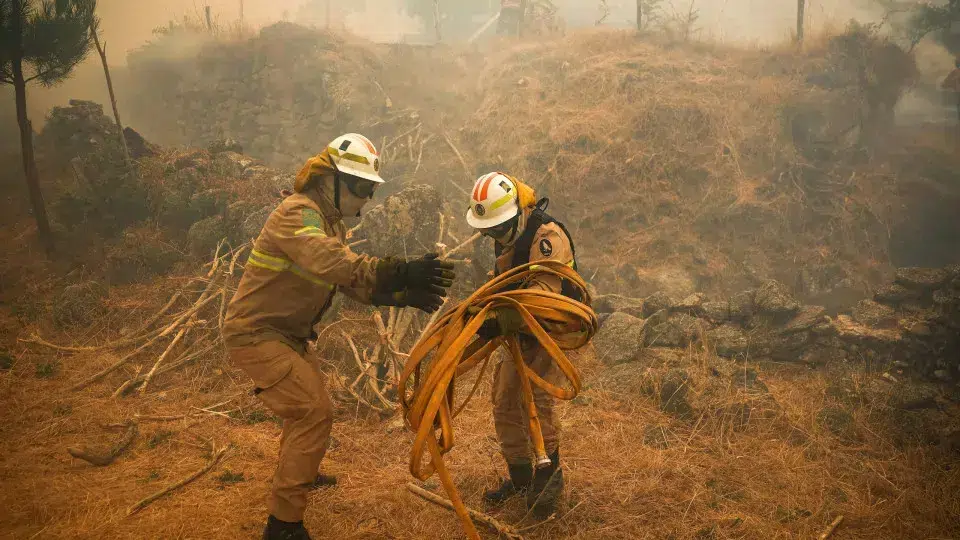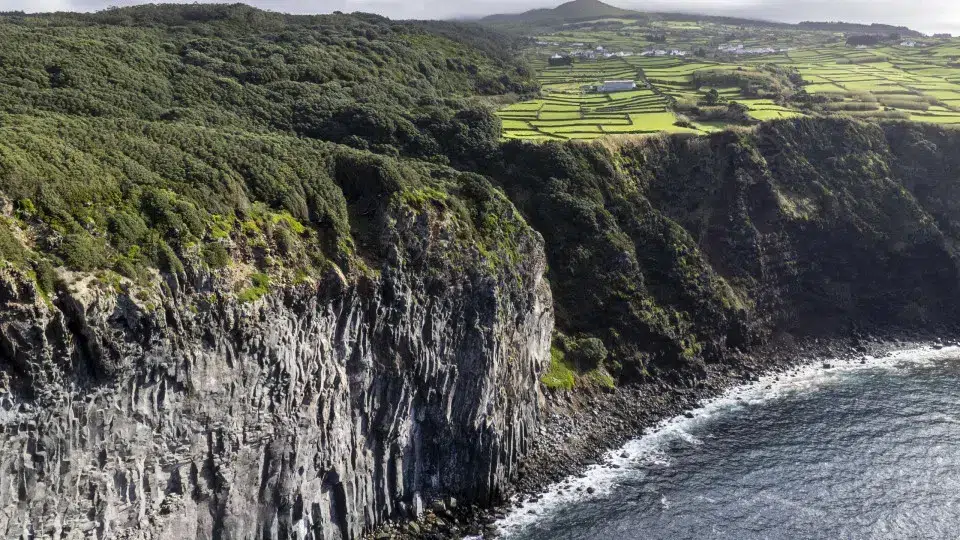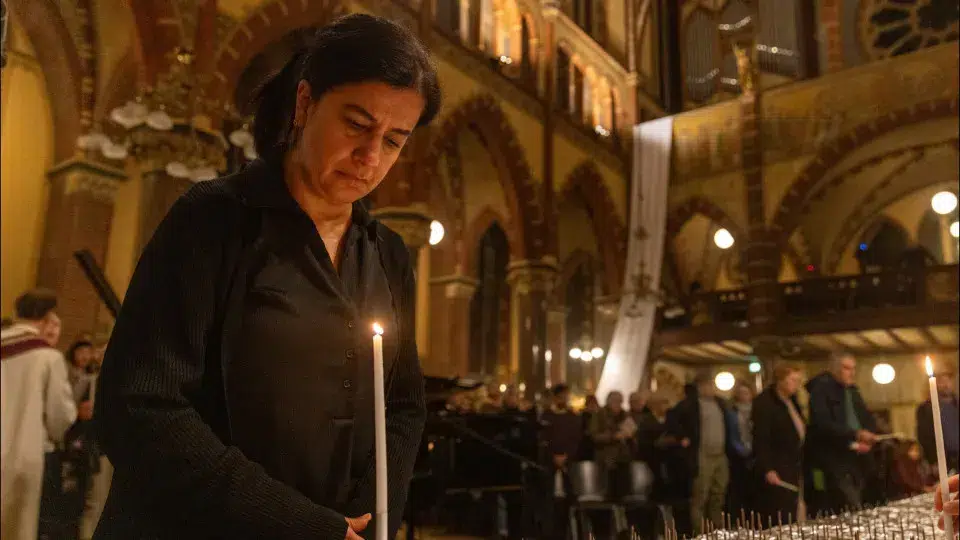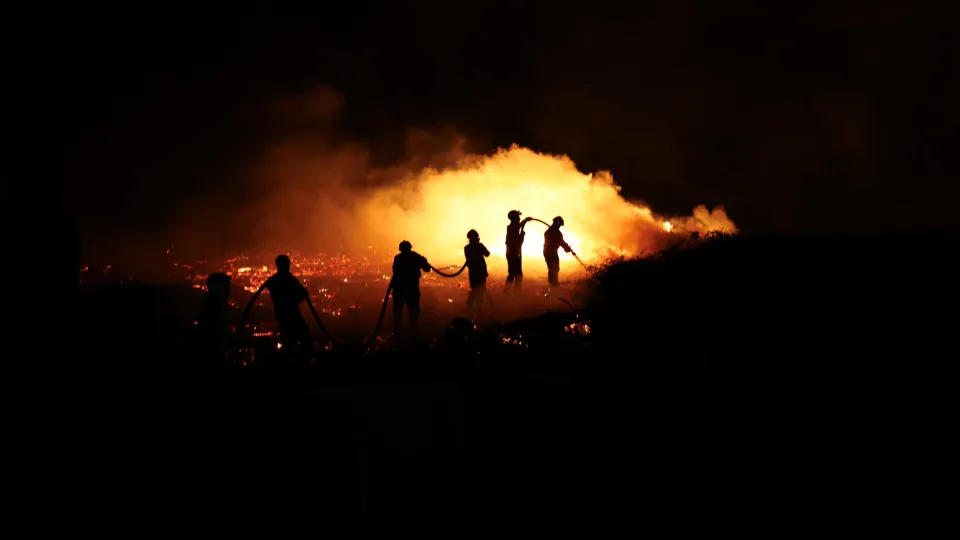
“Democratization now”; “Biodiversity now”; “No more of the same, eucalyptus out of the ground”; “Forest is life”; “Monoculture=Monopoly?Democracy”; “We are the forest”; “Burn only corruption”, were among the slogans displayed on posters during a protest in São Pedro do Sul, Viseu district, a municipality that was engulfed by flames exactly one year ago.
Through a megaphone, the call was: “more forest, less monoculture”, in a march that resonated with the aid of musical instruments like drums and bagpipes that could not drown out the chants.
About fifty people responded to the call from the Forest Emergency Network/Future Forest which organized protests today in 15 cities across the country to express their “indignation” over the annual fires, stated one of the organization’s members, Rita Martins.
“We intend to make demands regarding monoculture forest policies, which is a national scourge that we must counteract. We cannot continue to manage our territory to serve economic interests, under an extractive perspective. There needs to be collaboration and involvement of the population,” she argued.
Rita Martins explained that the protest, starting at Parque das Nogueiras and continuing a half-kilometer walk to Praça da República, carries “three major slogans: de-eucalyptus, democratize, and decarbonize”.
“We are shifting away from this logic of subjecting ourselves to the interests of the fossil industry. Our pulp industry is the largest contributor to the national GDP, but it also contributes greatly to the devastation and destruction of the territory,” she justified.
Democratization is needed because “communities should be involved” and “these decisions should not be made far removed from reality.” “We are here and have ideas, and we would like to be heard,” she maintained.
“And de-eucalyptus, because at least 10% of our territory is occupied by eucalyptus. However, these are statistics from 2015 and are very outdated. Each year, as we encounter fires, that area keeps expanding,” she pointed out.
Rita Martins emphasized that “the destruction caused by the fires” in the country creates “a trauma that is not being understood, perceived, or acknowledged.”
“I feel that each year, as summer arrives, it has ceased to be that season of leisure, holidays, relaxation, and harvest, becoming instead a season of turmoil, fire, trauma, and total anxiety,” she considered.
For this Portuguese woman, born in Lisbon, having lived in various parts of the country such as Arganil and Germany, and residing in São Pedro do Sul for just over a year, the fires also represent insecurity following the experiences of 2017 in Arganil and last year in São Pedro do Sul.
“I couldn’t stay in my homeland because I felt I had no capacity to defend it. Even emotionally, we had once again to seek solace and protection in concrete, when we so dearly want to protect what’s most sacred,” she referred.
During the São Pedro do Sul protest, the “majority of citizens” were foreigners who chose to “live in the ‘magical mountains'” precisely because they are “attracted by all the existing magic” in this territory.
“They are of various nationalities: we have Germans, Americans, Belgians, Dutch, and Jamaicans among those I know, and few Portuguese. There’s a multicultural presence here in the municipality,” stated Rita Martins.
Among those Portuguese was the couple Joaquim Cunha and Maria Luísa Barbosa, residing in Ovar, Aveiro district, but “currently tending to their farm” in Oliveira de Frades, a nearby municipality also in the Lafões region.
“When we found out about this demonstration, we came, of course. But I am very surprised by the human diversity here. And there’s nobody wearing a tie! Foreigners fight more for our territory than we, Portuguese, who are rather complacent,” they said.
Speaking to a news agency, this couple also argued that “producers who plant oak, for instance, which is more resistant to fire but slower to become profitable, should receive a subsidy for planting” this native species.
“Because I understand why they plant eucalyptus; it’s quickly profitable. Okay, but there should be zoning regulations in its planting, and support should be given to those who wish to opt for other species, so that there’s profitability in all, but more forest diversity as well,” Joaquim Cunha argued.
The protests also took place in Águeda and Aveiro (Aveiro district), Arganil, Coimbra, Lousã, and Oliveira do Hospital (Coimbra), Sertã and Proença-a-Nova (Castelo Branco), Pedrógão Grande and Leiria (Leiria), Braga, Lisbon, Porto, and Odemira (Beja).
The “Forest Emergency Network/Future Forest” was established in 2022 in the aftermath of an initiative that highlighted the problem of fires, through a climate justice caravan that covered approximately 400 kilometers, from Figueira da Foz to Lisbon, passing by areas most affected by forest fires.




